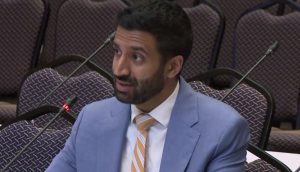Having fewer pilots in the pipeline, thanks to the strike and last week’s cancellation by Hollywood studios of many writers’ contracts, will almost certainly accelerate ad rates for next season’s programming, says Scott Stewart, a director at Toronto-based Genesis Vizeum
How is the strike affecting your buying activities?
‘The impact on our day-to-day activities has been minimal. Some adjustments are being made to ensure client investment is sound and delivered, but we are not really experiencing anything out of the ordinary. Looking forward (i.e., February onwards), we will be required to revise buys that will include un-projected, non-original programming vs. what was originally bought to ensure compensation is accurate.
‘Our biggest concern is not necessarily if audiences and GRPs will post as bought (networks have promised make-goods and ensured delivery as bought), but audience engagement.’
Why?
‘Because compensation doesn’t exist for a brand-new episode of CSI or Criminal Minds, and replacing audience numbers mathematically and without equivalent programming just isn’t comparable. We know this from what we experienced during the 2004-05 NHL lock-out. Our relevant audience didn’t go elsewhere – they simply disappeared.’
Are you revising media plans at this time?
‘Currently, no. But we are considering other planning elements or media choices to account for reduced ‘engagement’ quotient to make up for a softer TV climate as early as summer.
‘Are we shifting investment earmarked for dramas and comedies to sports and reality? Absolutely. Demand for fresh reality and alternative programming is going to be hyper-accelerated the longer the strike continues, and we have already reacted. That said, we have to secure the best available, first-run or high-profile programming on our clients’ behalf.’
Are there other alternative opportunities you’re focusing on?
‘We are considering other alternatives to provide additional support to plans in the event the strike dramatically affects the long-term outlook (i.e., fall 2008 and beyond). But no plans for traditional advertisers have been made to resign television in favour of other mediums. That would be impulsive.
‘But it is safe to predict that the upcoming fall 2008 upfronts will be a vast indicator as to whether it will be necessary to create viable investment options.’
How far ahead are we Plan B-ing for?
‘The situation is still touch and go, but things are relatively status quo. We believe that successful reality TV franchises such as American Idol, [Celebrity] Apprentice, America’s Next Top Model, Amazing Race and Survivor will continue to toe the corporate network lines for the spring ’08 lineup and demonstrate equivalent numbers to top scripted programs.
‘We feel that this, and profit margins being greater for the networks with reality programming, will force the WGA’s hand and that they will come to terms, just like in the previous strike in 1988. The previous strike lasted 21 weeks. Based on a comparable time line, our assumptions are that:
• The WGA strike will end in late March, giving the networks enough time to produce some new programming for the fall ’08 schedule.
• There will be no pilots this year – unless adequate programming is already on the shelf – so the focus will be on tried-and-true franchises to ensure that audiences will return to proven programming such as the CSI franchises, Law & Order, House, ER and Grey’s Anatomy.
• There will be an approximately four-week lag post-Labour Day, with new episodes on-air by early to mid-October. With that programming, audiences will return.’
What will happen if there are very few pilots coming out of Hollywood?
‘Fewer pilots equal more reality. Based on how softly new shows have performed in recent years, and how very few last past one season anyway, this isn’t really an issue for us – based on our current hesitation to invest in new programming, anyway.
‘This offers networks the best immediate solution for fall projections, and we will be forced to increase our composition of reality programming. That said, we fear that lack of fresh programming will quicken demand and therefore accelerate rates for fall 2008. Agility and a new approach – i.e., revised dayparts, percentage of cable allocation, new programming choices based on viewership migration predictions, etc. – will be essential in securing the best inventory on schedules.’
Should Canadian networks look elsewhere in the world for new programming?
‘It presents a greater homogenous opportunity and the development of CanCon programming vs. exploring international options. Based on US success, HBO titles also offer good opportunities.’
Do you see any other impact beyond prime-time TV?
‘There will be effects on fringe programming, in particular soap operas. But with daytime conventional audiences declining and specialty TV audiences continuing to grow, we have alternatives in the way of increasing total cable audience compositions to account for this shift. Specialty TV not only offers fresh programming, but if audiences migrate to cable during daytime viewing, we can rationalize a shift in dollars based on effectiveness of targeting via lifestyle interests or ‘info-tainment.”
What are your thoughts as to the short- and long-term impact of the writers’ strike?
‘As to the short term, our summer 2008 schedule came four months early. Standard decline will thus fall in line with traditional spring vs. summer audience disparities. Although declines will not be as dramatic as they were during the last WGA strike, due to having enough reality programming to fill the gaps, audience fall-off is a given, altering the spring 2008 season to one of containment and impression preservation.
‘As to the long-term impact, with studios cancelling writers’ contracts, we can be all but assured that there will be no new programs of quality for the fall 2008 upfronts. But any predictions of reality TV audiences waning are redundant. The WGA strike has bought reality programming at least another two to three network seasons of life.
‘An immediate quick fix once the strike is over is to return to tried-and-true prime-time franchises. This is unfortunate, as it would be nice to see some good new programs introduced to the schedule. And we need to prepare for some scripted programs to get tired – really fast.’
Any final rant?
‘I wish the networks would take more of a leadership approach and step up with an action plan, or at least scenario modeling, rather than merely taking the predictable ‘our hands are tied because we’re simulcasters’ position.’






















